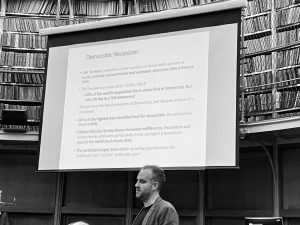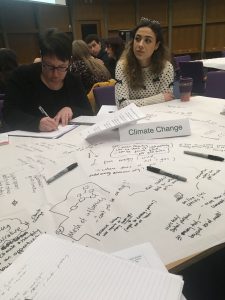Participation
Fire Starter Festival and the power of deliberative democracy
February 26, 2020 by Sophie Lock No Comments | Category Democracy, Event, Our work
‘Nothing about us without us’ is a mantra I often heard when working at a disability charity. The phrase has been a key part of the disability rights movement. It reflects the belief that decisions should never be made without the involvement of those affected.
For many in the world of health and social care, it can seem like decisions are made all the time without hearing from the people involved. What progress are we making?
Is deliberative democracy the answer?
Deliberative democracy is all the rage at the moment. By equipping people with evidence, they can have informed discussions to build a consensus on difficult topics. The actions can then be rolled out, with research showing that people trust the decisions of their peers.
Looking at the news, it quickly becomes very clear that health and social care is one of the trickiest topics society is grappling with at the moment. So it makes sense that in Scotland deliberative democracy methods have had a few outings in this sector. Crucially each have sought to include the experts by experience – those who will be affected by the decisions being made.
There are the Experience Panels set up by Social Security Scotland in 2017. So far 2400 people with experience of benefits have been involved in the transition of those benefits to Scotland. From giving advice on how to write a ‘good’, inclusive survey for panel members, through to sharing the challenges of applying online for a service, the panels will be essential in creating a system that works.
There’s also been the Our Voice Citizens’ Jury created by Scottish Health Council. The public jury members provided recommendations to the Scottish Government on how to strengthen shared decision making in health and care. The insights provided by the jury were then taken on board by policy makers.
In the world of social care, there’s the People-led Policy Panel. The panel’s role is to work with national and local government, and other organisations and individuals in the early development and testing of policies.
But has deliberative democracy been fully embedded?
 These initiatives are all a fascinating and promising start. But do they go far enough? That was the question being asked at the Fire Starter Festival event ‘Sharing Power: Embedding Deliberative Methods in Scotland’ last week.
These initiatives are all a fascinating and promising start. But do they go far enough? That was the question being asked at the Fire Starter Festival event ‘Sharing Power: Embedding Deliberative Methods in Scotland’ last week.
As well as discussions on health and social care, people talked about climate change, poverty and democratic reform. Prompted by Dr Oliver Escobar, Senior Lecturer in Public Policy, we considered whether each sector had fully embraced and recognised the need to include citizens at every level of policymaking.
In the last 10 years there has been a reduction in the number of democratic systems globally. The UK is currently at the highest-ever recorded level for democratic dissatisfaction. We are part of the 5% of the global population that live in a ‘full democracy’. How can we maintain our democracy and build trust?
the 5% of the global population that live in a ‘full democracy’. How can we maintain our democracy and build trust?
It was great to hear about the work that’s going on at Scottish Parliament and the Convention of Scottish Local Authorities (COSLA). We discussed the number of ways citizens are being empowered to participate in democracy through policy making.
But at the moment we all seem to agree that more needs to be done. These examples need to add up to more than the sum of their parts to ensure people’s voices are heard. Of course events such as the Fire Starter Festival provide great opportunities to check in on our progress. What about the next steps?
In the Digital Engagement team we’re going to be thinking about how digital can be used to regularly and strategically to involve people in the biggest topics of our time. It’s fair to say the ‘there’s nothing about us without us’ motto will be crucial in how we go about that.
Tags: collaboration, community empowerment, community engagement, COSLA, deliberative democracy, democracy, e-democracy, firestarter festival, Local Government, open government

Leave a comment